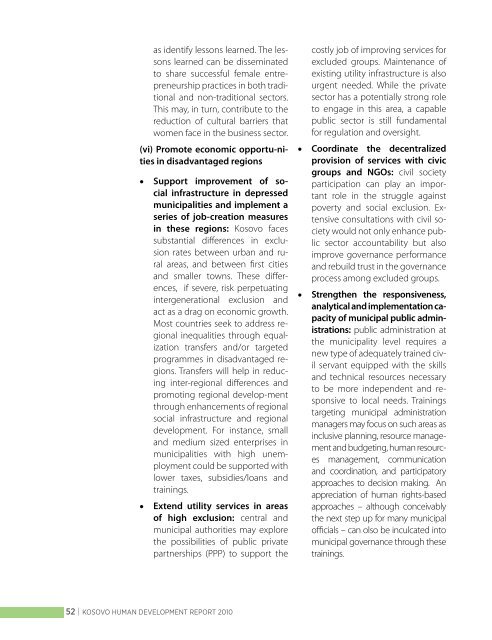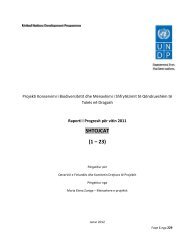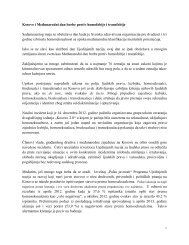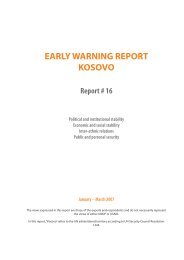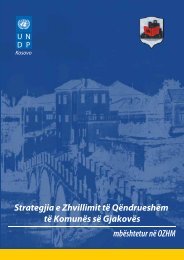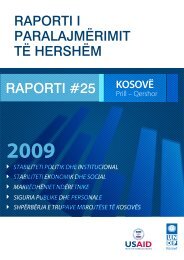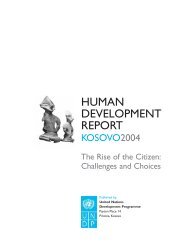Kosovo Human Development Report 2010 - UNDP Kosovo - United ...
Kosovo Human Development Report 2010 - UNDP Kosovo - United ...
Kosovo Human Development Report 2010 - UNDP Kosovo - United ...
Create successful ePaper yourself
Turn your PDF publications into a flip-book with our unique Google optimized e-Paper software.
as identify lessons learned. The lessons<br />
learned can be disseminated<br />
to share successful female entrepreneurship<br />
practices in both traditional<br />
and non-traditional sectors.<br />
This may, in turn, contribute to the<br />
reduction of cultural barriers that<br />
women face in the business sector.<br />
(vi) Promote economic opportu-nities<br />
in disadvantaged regions<br />
• Support improvement of social<br />
infrastructure in depressed<br />
municipalities and implement a<br />
series of job-creation measures<br />
in these regions: <strong>Kosovo</strong> faces<br />
substantial differences in exclusion<br />
rates between urban and rural<br />
areas, and between first cities<br />
and smaller towns. These differences,<br />
if severe, risk perpetuating<br />
intergenerational exclusion and<br />
act as a drag on economic growth.<br />
Most countries seek to address regional<br />
inequalities through equalization<br />
transfers and/or targeted<br />
programmes in disadvantaged regions.<br />
Transfers will help in reducing<br />
inter-regional differences and<br />
promoting regional develop-ment<br />
through enhancements of regional<br />
social infrastructure and regional<br />
development. For instance, small<br />
and medium sized enterprises in<br />
municipalities with high unemployment<br />
could be supported with<br />
lower taxes, subsidies/loans and<br />
trainings.<br />
• Extend utility services in areas<br />
of high exclusion: central and<br />
municipal authorities may explore<br />
the possibilities of public private<br />
partnerships (PPP) to support the<br />
52 | KOSOVO HUMAN DEVELOPMENT REPORT <strong>2010</strong><br />
costly job of improving services for<br />
excluded groups. Maintenance of<br />
existing utility infrastructure is also<br />
urgent needed. While the private<br />
sector has a potentially strong role<br />
to engage in this area, a capable<br />
public sector is still fundamental<br />
for regulation and oversight.<br />
• Coordinate the decentralized<br />
provision of services with civic<br />
groups and NGOs: civil society<br />
participation can play an important<br />
role in the struggle against<br />
poverty and social exclusion. Extensive<br />
consultations with civil society<br />
would not only enhance public<br />
sector accountability but also<br />
improve governance performance<br />
and rebuild trust in the governance<br />
process among excluded groups.<br />
• Strengthen the responsiveness,<br />
analytical and implementation capacity<br />
of municipal public administrations:<br />
public administration at<br />
the municipality level requires a<br />
new type of adequately trained civil<br />
servant equipped with the skills<br />
and technical resources necessary<br />
to be more independent and responsive<br />
to local needs. Trainings<br />
targeting municipal administration<br />
managers may focus on such areas as<br />
inclusive planning, resource management<br />
and budgeting, human resources<br />
management, communication<br />
and coordination, and participatory<br />
approaches to decision making. An<br />
appreciation of human rights-based<br />
approaches – although conceivably<br />
the next step up for many municipal<br />
officials – can olso be inculcated into<br />
municipal governance through these<br />
trainings.


